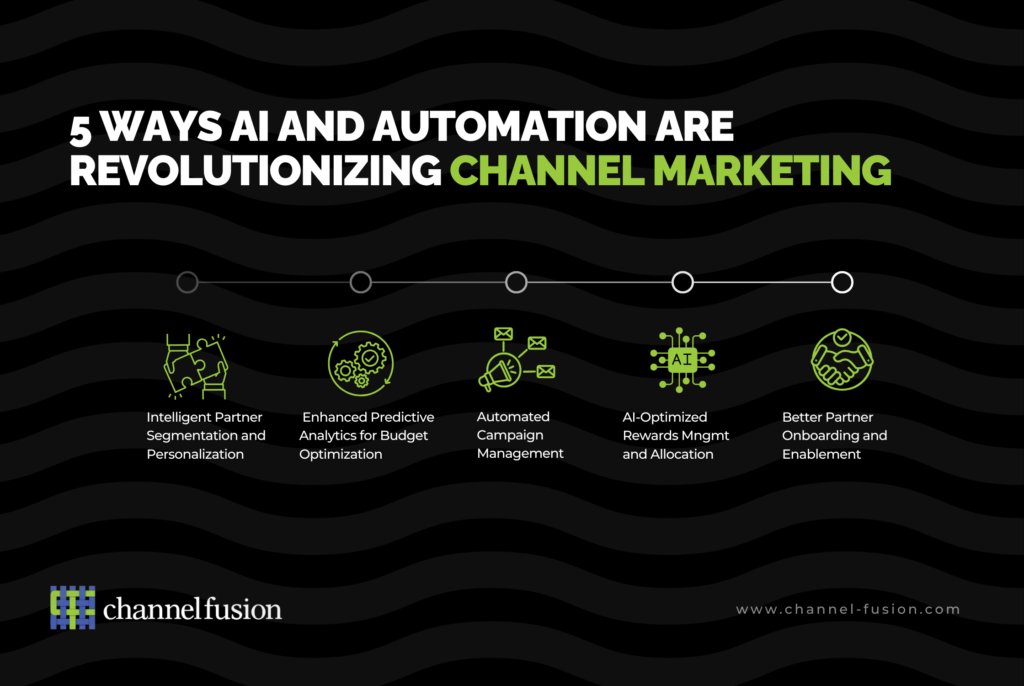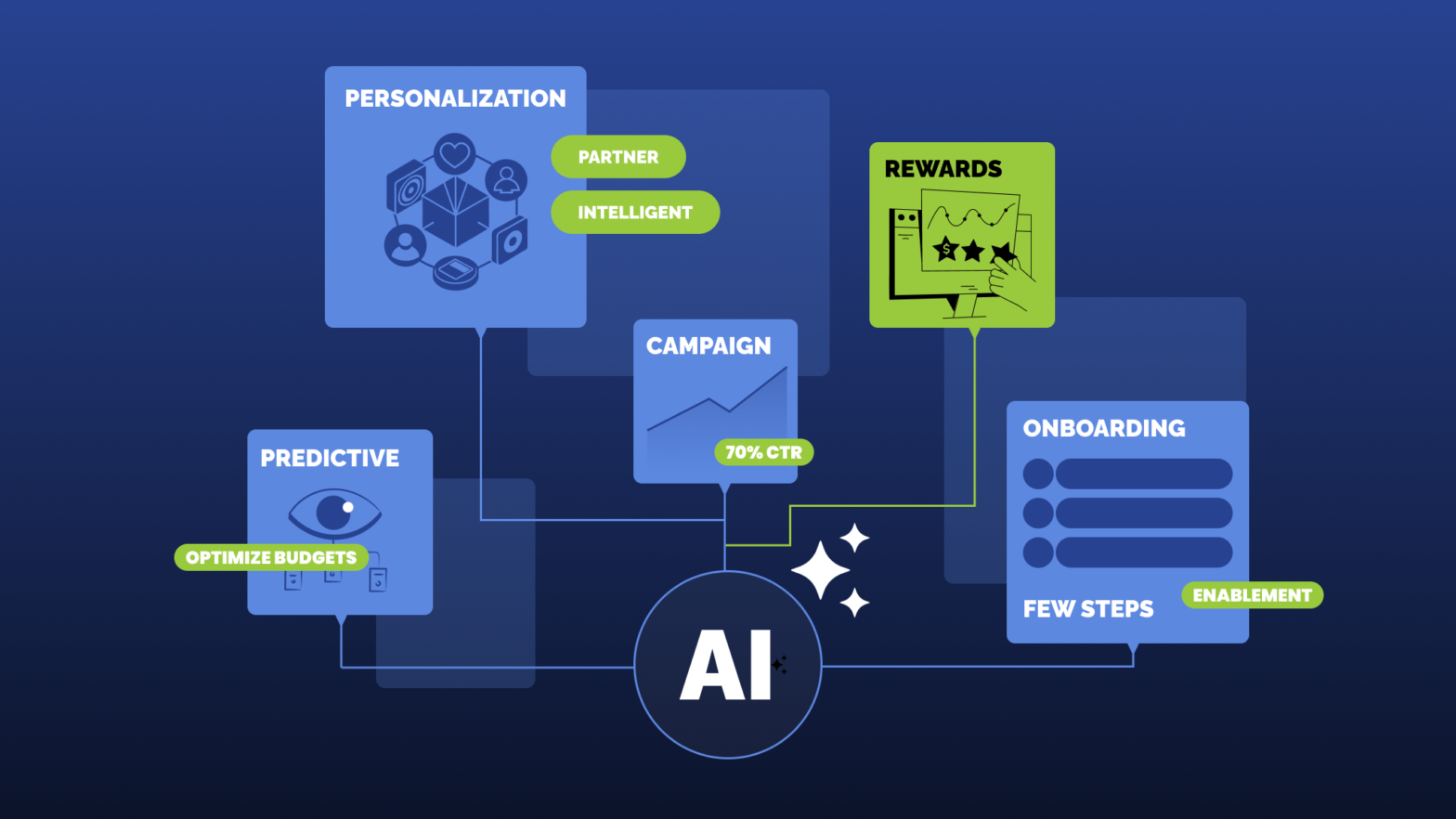As the New Year approaches, businesses everywhere are gearing up to plan for a more successful year ahead. For channel businesses, the year 2025 is set to be a transformative one. While there are many factors contributing to this transformation, we are here to share our thoughts on AI and automation in channel marketing.
A recent Forbes survey reveals that 64% of businesses believe AI has the potential to enhance customer relationships, while 60% see it as a tool to boost productivity. These statistics highlight AI’s growing role as a key driver of business growth and development.
In channel-centric businesses, brands and channel partners come across rapid technological advancements. The adaptation of these advancements, like artificial intelligence in channel marketing, is becoming essential for efficiency, personalization, and growth. Thus, for channel marketers, understanding the nuances of these technologies is not just a competitive advantage; it’s a necessity.
In this blog, we explore five ways AI and automation are reshaping the channel marketing industry, offering actionable insights and a glimpse into the year 2025 and beyond. But before covering these trends, let’s first explore the role of AI and automation in channel marketing.
The Role of AI and Automation in Channel Marketing

Channel marketing has traditionally been a mix of complex tasks like managing budgets, optimizing incentives, and tracking partner performance. AI and automation are simplifying these processes, making them more efficient and impactful.
Today, these technologies enable marketers to move from tactical tasks—such as data collection and campaign execution—to strategic decision-making informed by predictive analytics and actionable insights.
Why the Channel Ecosystem is Ripe for Innovation
If you’re part of a channel ecosystem, you are probably familiar with the decentralized nature of channel marketing. It includes multiple partners, geographies, and verticals, creating a unique challenge for brands and channel partners to be on the same page. Manual processes are prone to inefficiencies and errors, which often result in subpar ROI.
Enter AI and automation: technologies designed to handle massive data volumes, uncover patterns, and suggest strategies with precision, making them indispensable for modern channel marketers. Let’s see how AI and automation in channel marketing promises growth:
1. Intelligent Partner Segmentation and Personalization
Gone are the days of one-size-fits-all channel partner strategies. AI helps marketers segment their partners more precisely by analyzing data like performance, regional preferences, and customer behavior.
AI tools analyze partner activities, past campaigns, and customer demographics to recommend personalized marketing strategies. For example, instead of sending generic promotions, brands can deliver tailored incentive programs that align with each partner’s unique strengths. These AI-enhanced partner programs offer hyper-personalization that not only drives partner engagement but also fosters loyalty.
An innovative incentive management solution that uses AI and automation can help brands create and execute these personalized campaigns seamlessly. It can automate the process of targeting, tracking, and rewarding the right partners at the right time.
2. Enhanced Predictive Analytics for Budget Optimization
Marketing Development Funds (MDF) and Co-op programs often fall short of their potential due to inefficient allocation. Predictive analytics powered by artificial intelligence in channel marketing is changing that narrative on a big scale.
AI-driven predictive models analyze historical data to forecast future campaign performance. This helps brands to allocate channel marketing budgets more effectively, ensuring funds are directed toward high-ROI activities.
By leveraging predictive analytics, brands can move beyond gut-feeling decision-making and make data-driven choices. For example, if historical data shows that certain regions or product categories consistently outperform others, AI can help marketers reallocate funds to those areas, ensuring that the marketing budget is spent where it will have the most impact.
This results in more efficient use of resources and better ROI from MDF and Co-op programs.
3. Automated Campaign Management
Channel campaigns are notoriously complex, involving multiple stakeholders and deliverables. Automation takes the guesswork out of campaign management by streamlining workflows and reducing manual effort. Automated channel engagement tools handle tasks such as email outreach, lead nurturing, and reporting. AI ensures campaigns are optimized in real time.
For channel marketing leaders, this means less time spent on administrative tasks and more time strategizing. Automation not only streamlines repetitive tasks but also ensures campaigns are continuously optimized for better performance.
For example, if an email campaign is not performing well, AI can automatically tweak subject lines, adjust send times, or segment the audience for better engagement, all in real time. This reduces the need for manual intervention.
Additionally, AI-based asset libraries and resources further enhance campaign efficiency. These tools provide pre-built templates, best practice guidelines, and customizable resources that allow partners to quickly launch and optimize campaigns with minimal effort.
4. AI-Optimized Rewards Management and Allocation
Managing rewards programs for channel partners—whether through rebates or SPIFFs (Sales Performance Incentive Funds) —can be complex and time-consuming. AI-powered channel management platforms can automate the allocation of rewards based on partner performance, ensuring that the most deserving partners receive timely and accurate rewards.
By analyzing historical data and predicting future trends, AI suggests optimal reward structures for individual partners, enhancing motivation and driving better results.
For instance, AI can dynamically adjust SPIFFs based on real-time performance. If a salesperson exceeds targets early in the quarter, the system can increase their SPIFF to maintain momentum. This type of automation reduces manual oversight and ensures partners are always incentivized to perform at their best.
Additionally, artificial intelligence in channel marketing streamlines rebate management by automating the validation of claims. For example, when a customer submits a rebate, AI cross-checks the sales data to ensure all conditions are met before approval, reducing errors and fraud.
It also predicts rebate trends and alerts partners about approaching deadlines, making the process quicker and more efficient for both brands and partners.
5. Better Partner Onboarding and Enablement
AI and automation significantly help brands with partner enablement and onboarding processes. Through AI, brands can assess each partner’s background, capabilities, and specific nee AI and automation in channel marketing ds, tailoring training modules and resources accordingly.
Automation further streamlines the administrative tasks involved in onboarding like automating contract management, granting access to relevant tools, and ensuring compliance with brand guidelines. For instance, an automated channel engagement system can quickly verify the necessary documentation and activate partner accounts, reducing delays and allowing partners to get started immediately.
Additionally, AI allows continuous partner enablement by providing ongoing training and support tailored to the evolving needs of a channel partner. AI can track partner performance and based on results, recommend specific resources or training to address knowledge gaps.
By leveraging AI to continuously personalize the partner experience, brands can maintain strong, productive relationships, empowering partners to succeed long after the initial onboarding phase.
A Glimpse into the Future of Channel Marketing
The usage of AI and automation in channel marketing is not just a phase—it’s the future. As these technologies continue to evolve, their potential to drive efficiency, personalization, and profitability will only grow.
Channel Fusion is at the forefront of this transformation, offering solutions that empower brands to navigate this new era with confidence. Whether it’s optimizing Co-op programs or crafting smarter incentives, our platform is built to meet the challenges of 2025 and beyond.
Get Ready for 2025 with Our Exclusive Whitepaper
Excited to learn more about the trends shaping the future of channel marketing? Our upcoming whitepaper, The State of Channel Marketing 2025, dives deep into the strategies and technologies that will define the industry.
Pre-register below by clicking Get Notified, to access the whitepaper as soon as it’s released in January 2025. Let’s shape the future of channel marketing—together.



